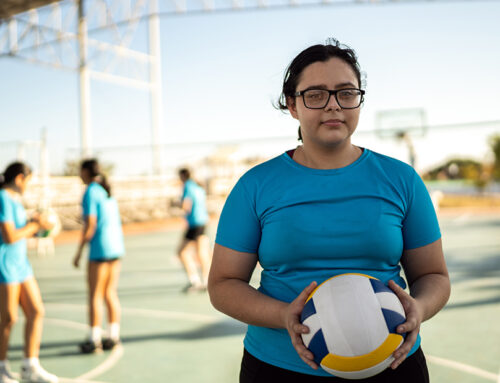10 Characteristics of an Awesome Teammate
Great teams are built with great teammates.
When the Miami Heat brought LeBron James and Chris Bosh in to team with Dwyane Wade, their friendship off the court and willingness to give up some of the individual spotlight delivered the team back-to-back championships.
But you don’t necessarily have to be best friends with someone to be a great teammate for them. You also don’t have to be the best player on the team to be a great teammate. That’s the beauty of sports—you can always control your effort and attitude, which in turn has a huge effect on how you impact your team.
With that, here are 10 qualities amazing teammates tend to have in common.
1. They Develop Real Relationships
You don’t have to be best friends with everyone on your team, but developing a relationship with each of your teammates and knowing them off the court/field will strengthen your relation and communication when it counts.
Chances are you have heard stories about how Steve Nash or Wayne Gretzky made their teammates so much better simply by knowing the areas they liked to receive the ball or puck best. That’s some real in-game knowledge of a teammate, but what you might not see is the personal connection they built in the locker room that increased the resiliency and competitiveness of the team.
2. They’re Willing to Play Any Role
Everyone wants to be a starter, but are you willing to play a role off of the bench? Is it more important to start the game than it is to finish it? Are you willing and able to play out of position?
Great teammates are willing to do whatever it takes to help their team win—even if it might not be a role they initially envisioned themselves performing. Under head coach Bill Belichick, the New England Patriots have become perhaps the greatest dynasty in NFL history thanks to their players’ willingness to “Do Your Job,” whatever that job may be.
3. They Work Hard to Improve
What are you doing away from team practice to become a better player? Are you working on your individual skills? Are you studying the game? Are you willing to ask questions and learn?
Stories of the greatest players in sport putting in extra time are plentiful, and the ripple effect their work ethic had on their teammates made a massive impact on their team.
If you’re not actively trying to get better, it’s hard for me to call you a great teammate!
4. They Lead by Example
Not all great players are naturally great verbal communicators.
However, actions speak louder than words. You don’t have to be a “rah-rah” guy to be a great teammate, because how you carry yourself says more than anything. Examples of actions that have a positive impact on those around you include:
- You’re one of the first in the building/park and one of the last to leave.
- You hustle back on defense and are consistently ready to perform your role on that end.
- You stay engaged on the bench and support your teammates.
- You encourage all teammates, not just your closest friends.
- You listen to the coach when they speak and are able to execute the game plan they outline.
5. They Always Come Prepared
If a practice starts at 6 p.m., are you rolling in at 5:59 p.m., or are you arriving early to make sure you’re physically and mentally ready to go?
Do you have the right attire and equipment?
Have you studied the playbook? Do you know what is expected from your position and others just in case Coach puts you in a different role?
Great teammates stay prepared so that they can lift up their squad instead of dragging it down.
6. They Understand Their Strengths/Weaknesses
Great teammates know what it is they bring to the team. Be confident in your abilities, but also do your best to maximize your strengths and leverage them consistently.
The guy who bricks 9 out of 10 3-pointers yet constantly pulls up from deep? Yeah, no one’s rushing to award him any “Great Teammate” awards.
But the guy who’s rebounding his butt off play after play because he knows that’s one of his best opportunities to make an impact? They’ve got great teammate written all over them.
7. They Always Have a Positive Attitude
It is understandable that players get frustrated when they miss shots or drop passes, but are you letting that take over your game?
How would you feel if your teammate let one bad play snowball into a bad half or game? Probably not all that confident in said teammate’s mental and physical state.
Mistakes happen. Great teammates stay positive when they make mistakes themselves or when their teammates come up short. Are they encouraging a teammate who makes a mental error to forget it and focus on the next play, or simply chewing them out? And when a teammate drains a shot or makes an awesome hustle play, are they giving praise and energetic feedback or simply acting like nothing happened?
Players might not think these little details matter, but the truth is they form the foundation of successful teams.
8. They Hold Themselves and Others Accountable
Every athlete know they should be accountable. But what does it actually look like in practice?
For starters, it means knowing all the offensive and defensive strategies, showing up to each practice with the right mindset (even if they’re sidelined by injury), making sure their teammates are prepared, and keeping up with schoolwork so they can continue to attend team activities.
If an athlete is feeling like skipping practice or constantly arrives late, great teammates pick them up both figuratively and sometimes literally to make sure they get to where they need to be for everyone to be successful.
Additionally, being accountable means getting and staying in shape. This doesn’t happen by simply showing up at practice and then treating your body like crap for the other 22 1/2 hours a day. Eat right, drink water, get enough sleep, train with intent and take care of your body. You’d be amazed at the ripple effect consistently committing to such actions has on your teammates.
9. They Do Extra Work
Perhaps the biggest foundation of being a great teammate is setting a great example for the other athletes on your team.
With that in mind, great teammates must be willing to work hard on improving their game outside of mandatory activities.
Hard work is contagious. If your teammates see how hard you’re working, they will want to do the same. Don’t wait for someone else to set the example.
10. They Always Give 100 Percent Effort
Whether the game is a blowout win or a lopsided loss, how you play at all times will be noticed by coaches, teammates, the opposing team, the officials and the fans.
If you are coming off the bench for only a handful of minutes, play 100 percent. If you are still bleary-eyed at an early morning practice, play 100 percent. If you are having a bad shooting night, still give 100 percent effort and find a way to make in impact with your rebounding, defense, energy, enthusiasm, etc. Effort, hard work and the willingness to compete is a personal choice. Being a great teammate is about staring down those choices and making the decision that not only makes yourself better, but also makes the team better.
Great teams don’t just have great athletes. They have great teammates. If you’re not living these 10 qualities, now is the time to start!
Photo Credit: monkeybusinessimages/iStock
READ MORE:
RECOMMENDED FOR YOU
10 Characteristics of an Awesome Teammate
Great teams are built with great teammates.
When the Miami Heat brought LeBron James and Chris Bosh in to team with Dwyane Wade, their friendship off the court and willingness to give up some of the individual spotlight delivered the team back-to-back championships.
But you don’t necessarily have to be best friends with someone to be a great teammate for them. You also don’t have to be the best player on the team to be a great teammate. That’s the beauty of sports—you can always control your effort and attitude, which in turn has a huge effect on how you impact your team.
With that, here are 10 qualities amazing teammates tend to have in common.
1. They Develop Real Relationships
You don’t have to be best friends with everyone on your team, but developing a relationship with each of your teammates and knowing them off the court/field will strengthen your relation and communication when it counts.
Chances are you have heard stories about how Steve Nash or Wayne Gretzky made their teammates so much better simply by knowing the areas they liked to receive the ball or puck best. That’s some real in-game knowledge of a teammate, but what you might not see is the personal connection they built in the locker room that increased the resiliency and competitiveness of the team.
2. They’re Willing to Play Any Role
Everyone wants to be a starter, but are you willing to play a role off of the bench? Is it more important to start the game than it is to finish it? Are you willing and able to play out of position?
Great teammates are willing to do whatever it takes to help their team win—even if it might not be a role they initially envisioned themselves performing. Under head coach Bill Belichick, the New England Patriots have become perhaps the greatest dynasty in NFL history thanks to their players’ willingness to “Do Your Job,” whatever that job may be.
3. They Work Hard to Improve
What are you doing away from team practice to become a better player? Are you working on your individual skills? Are you studying the game? Are you willing to ask questions and learn?
Stories of the greatest players in sport putting in extra time are plentiful, and the ripple effect their work ethic had on their teammates made a massive impact on their team.
If you’re not actively trying to get better, it’s hard for me to call you a great teammate!
4. They Lead by Example
Not all great players are naturally great verbal communicators.
However, actions speak louder than words. You don’t have to be a “rah-rah” guy to be a great teammate, because how you carry yourself says more than anything. Examples of actions that have a positive impact on those around you include:
- You’re one of the first in the building/park and one of the last to leave.
- You hustle back on defense and are consistently ready to perform your role on that end.
- You stay engaged on the bench and support your teammates.
- You encourage all teammates, not just your closest friends.
- You listen to the coach when they speak and are able to execute the game plan they outline.
5. They Always Come Prepared
If a practice starts at 6 p.m., are you rolling in at 5:59 p.m., or are you arriving early to make sure you’re physically and mentally ready to go?
Do you have the right attire and equipment?
Have you studied the playbook? Do you know what is expected from your position and others just in case Coach puts you in a different role?
Great teammates stay prepared so that they can lift up their squad instead of dragging it down.
6. They Understand Their Strengths/Weaknesses
Great teammates know what it is they bring to the team. Be confident in your abilities, but also do your best to maximize your strengths and leverage them consistently.
The guy who bricks 9 out of 10 3-pointers yet constantly pulls up from deep? Yeah, no one’s rushing to award him any “Great Teammate” awards.
But the guy who’s rebounding his butt off play after play because he knows that’s one of his best opportunities to make an impact? They’ve got great teammate written all over them.
7. They Always Have a Positive Attitude
It is understandable that players get frustrated when they miss shots or drop passes, but are you letting that take over your game?
How would you feel if your teammate let one bad play snowball into a bad half or game? Probably not all that confident in said teammate’s mental and physical state.
Mistakes happen. Great teammates stay positive when they make mistakes themselves or when their teammates come up short. Are they encouraging a teammate who makes a mental error to forget it and focus on the next play, or simply chewing them out? And when a teammate drains a shot or makes an awesome hustle play, are they giving praise and energetic feedback or simply acting like nothing happened?
Players might not think these little details matter, but the truth is they form the foundation of successful teams.
8. They Hold Themselves and Others Accountable
Every athlete know they should be accountable. But what does it actually look like in practice?
For starters, it means knowing all the offensive and defensive strategies, showing up to each practice with the right mindset (even if they’re sidelined by injury), making sure their teammates are prepared, and keeping up with schoolwork so they can continue to attend team activities.
If an athlete is feeling like skipping practice or constantly arrives late, great teammates pick them up both figuratively and sometimes literally to make sure they get to where they need to be for everyone to be successful.
Additionally, being accountable means getting and staying in shape. This doesn’t happen by simply showing up at practice and then treating your body like crap for the other 22 1/2 hours a day. Eat right, drink water, get enough sleep, train with intent and take care of your body. You’d be amazed at the ripple effect consistently committing to such actions has on your teammates.
9. They Do Extra Work
Perhaps the biggest foundation of being a great teammate is setting a great example for the other athletes on your team.
With that in mind, great teammates must be willing to work hard on improving their game outside of mandatory activities.
Hard work is contagious. If your teammates see how hard you’re working, they will want to do the same. Don’t wait for someone else to set the example.
10. They Always Give 100 Percent Effort
Whether the game is a blowout win or a lopsided loss, how you play at all times will be noticed by coaches, teammates, the opposing team, the officials and the fans.
If you are coming off the bench for only a handful of minutes, play 100 percent. If you are still bleary-eyed at an early morning practice, play 100 percent. If you are having a bad shooting night, still give 100 percent effort and find a way to make in impact with your rebounding, defense, energy, enthusiasm, etc. Effort, hard work and the willingness to compete is a personal choice. Being a great teammate is about staring down those choices and making the decision that not only makes yourself better, but also makes the team better.
Great teams don’t just have great athletes. They have great teammates. If you’re not living these 10 qualities, now is the time to start!
Photo Credit: monkeybusinessimages/iStock
READ MORE:










